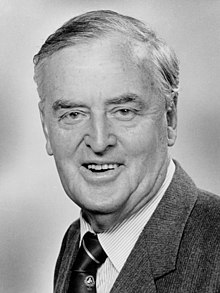Queensland National Party
From 1924 onward, it was the senior partner in the centre-right coalition with the state Liberal Party and its predecessors, in a reversal of the normal situation at the federal level and in the rest of Australia.John Appel, a former minister who had broken with Denham, became the leader of what was now a distinct separate Country Party grouping in the Legislative Assembly of Queensland.In 1921 James Hunter won the Division of Maranoa in a by-election, giving the Country Party their first federal member in Queensland.[17] The CPNP won power at the 1929 state election but the Moore Ministry would only last one term amidst the challenges of the Great Depression, being defeated in 1932.Nicklin initially considered offering support to Gair, but then declined when Fadden–by then, de facto federal Deputy Prime Minister–argued there was the opportunity for the Country Party to win power in its own right.[29] The Nicklin Ministry governed over what has been described as "the most tranquil decade of [Queensland's] recent political history",[30] but within the parties tensions were growing over the balance of the Coalition.His government pursued uncompromising conservatism, taking an especially heavy-handed line against trade unions and demonstrators, leading to accusations that Queensland had become a banana republic.[37] However the changing nature of Queensland meant that the rural population was in decline while provincial cities were growing, placing the Country Party's position under greater threat.Together with accusations surrounding his financial affairs this placed Bjelke-Petersen under immense pressure and he only narrowly survived a leadership challenge.Bjelke-Petersen soon set himself up as one of the most prominent and implacable foes of the Whitlam government, leading to the Prime Minister calling the Premier "a Bible-bashing bastard... a paranoic, a bigot and fanatical.[42] In parliament the Nationals pushed a number of policies and tactics, overcoming opposition from the Liberal leadership on matters ranging from the abolition of death duties[35] to breaking the convention on mid-term federal Senate replacements by filling a Labor vacancy with Albert Field, a nominal Labor member hostile to Whitlam, which contributed to the latter's dismissal.[44] The Nationals continued to dominate over the Liberals, who suffered increasing division over tactics between the parliamentary leadership, the backbenchers and the extra-parliamentary party.In 1982 Angus Innes challenged Edwards for the leadership, despite Bjelke-Petersen declaring he would prefer a minority government to a coalition with an Innes-led Liberal Party, and only narrowly lost by 12:10.[48] The Nationals governed as a minority for a few months until the 1983 state election at which they won 41 out of the 82 seats available, including several in Brisbane, while the Liberals were reduced to a mere eight.Due to the ensuing number of three-cornered contests, Labor won a third term, while the Nationals lost seats in Queensland.In hopes of buying more time, Russell Cooper, a National Party traditionalist, successfully challenged Ahern for the leadership.The new Labor government of Wayne Goss dismantled the "Bjelkemander"; the ensuing "one vote one value" reforms resulted in Brisbane electing nearly half of the legislature.As a result, the Nationals faced a much tougher route back into government and the next two decades would see renewed strong debate over relations with the Liberals, with the latter party initially instead seeking to achieve senior status and steadily replacing the Nationals as the main conservative party on the Sunshine Coast and then the Gold Coast.[53] Cooper stood down as leader in 1991 to be succeeded by Rob Borbidge, but despite the major changes to the electoral distribution the outcome of the 1992 election was much the same as 1989.[59] The election also saw the Nationals poll fewer votes than the Liberals for the first time in over a quarter of a century despite winning more seats, an outcome that would recur for the next decade.The next seven years saw a series of leaders - Mike Horan, Lawrence Springborg (twice) and Jeff Seeney - come and go with little further advancement in the 2004 state election.In 2005 Lawrence Springborg and Liberal leader Bob Quinn publicly explored merging their parties to present a fully united alternative to Labor, but by 2006 the plan was declared dead and buried.


LeaderNationalNorthern CountryLiberal National37 Merivale StreetSouth BrisbaneQueenslandYouth wingYoung NationalsIdeologyConservatismProtectionismAgrarianismEconomic liberalismRight-wing populismSocial conservatismPolitical positionCentre-rightright-wingFar-rightFederal NationalsLegislative Assembly1986–1989Politics of AustraliaPolitical partiesElectionsNational Party of AustraliaLiberal Party of AustraliaLiberal National Party of Queensland (LNP)Queensland Farmers' Unionconservativecoalitionstate Liberal PartyLiberal National Party of QueenslandFirst World War1915 electionLiberalgovernment ofDigby DenhamJohn AppelLegislative Assembly of QueenslandPrimary Producers' UnionNational Party1918 electionWilliam VowlesNorthern Country Party1920 state electionfederal Country PartyJames HunterDivision of Maranoaa by-electionQueensland United Party1923 state electionArthur Edward MooreCountry Progressive PartyCountry and Progressive National Party1929 state electionMoore MinistryGreat Depressionin 1932in 1935United Australia PartyTed Maherin 1938and 1941Arthur FaddenDivision of Darling DownsCountry-National OrganisationFrank NicklinQueensland Country PartyQueensland People's PartyJohn Beals ChandlerLiberal Party of Australia (Queensland Division)1944 state electionmalapportionmentLabor Party in Queenslandthe splitPremierVince GairQueensland Labor PartyDeputy Prime Ministersupply1957 state electionKenneth Morrispreferential votingNicklin MinistryRedcliffe PeninsulaGold Coast1966 state electionJack Pizzeyheart attackpremier of QueenslandJoh Bjelke-PetersenGordon Chalkbanana republicBjelkemanderAlbertthe 19691972 state elections1972 federal electionGough WhitlamWhitlam governmentstate Democratic Labor Partyan early electionPerc TuckerBrisbaneBill Lamondelectoral district of Wynnum1977 state electiondeath dutiesAlbert Fieldthe latter's dismissal1980 federal electionWilliam KnoxLlewellyn Edwards1980 state electionGinger GroupAngus InnesTerry White1983 state electionBrian AustinDon Lane1986 Queensland state election1986 state electionelected in 1983Bob Hawke